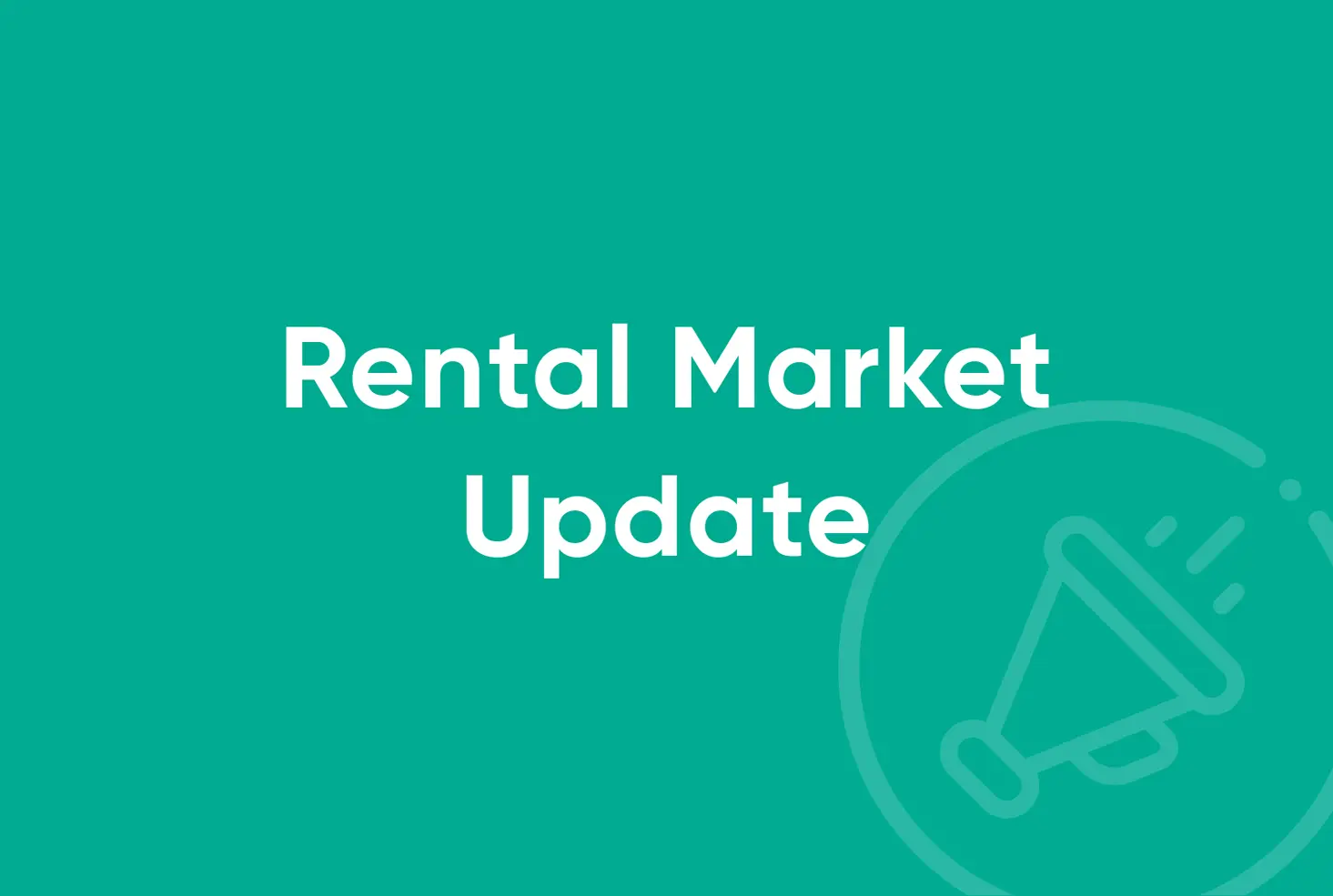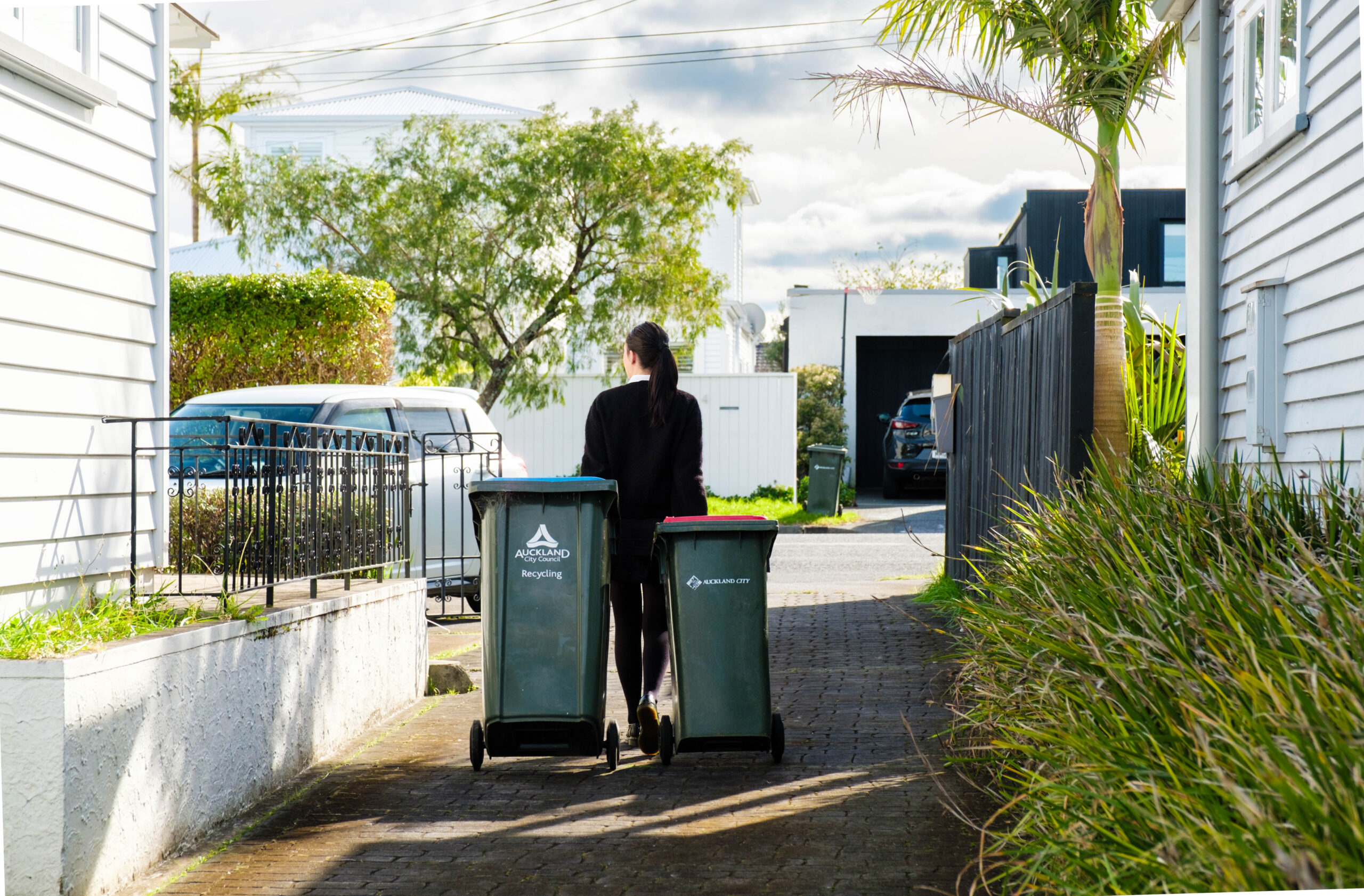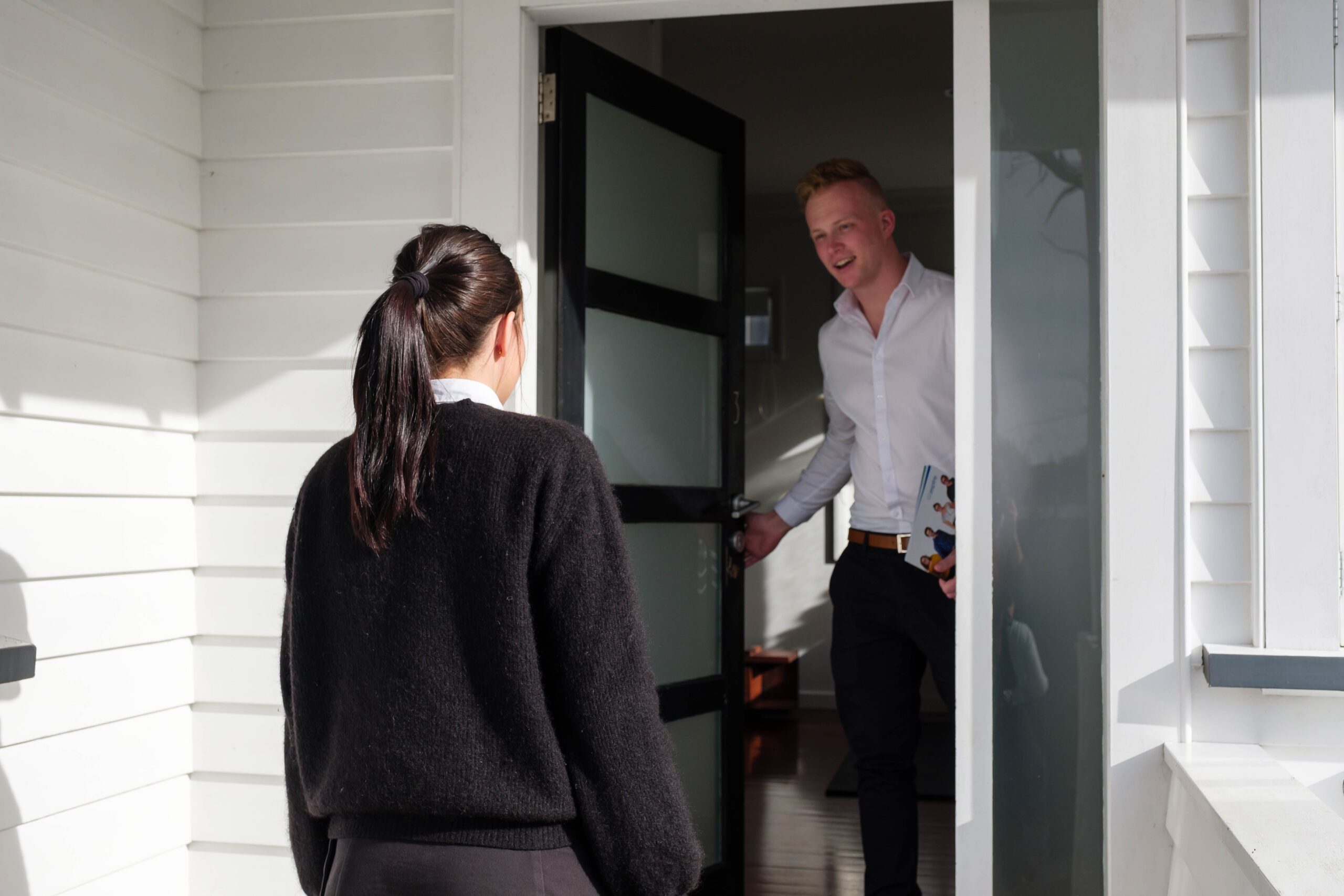Our Managing Director on the Radio
The state of the rental market has been a hot topic of late, and our MD Mike Atkinson has been in demand for radio segments and interviews.
His latest segment was on Saturday on the ZB OneRoof Radio show. In it, he discussed the challenging rental market for landlords and delved into the upcoming pet law changes and how they will affect all landlords.
Here are his other recent past interviews if you’re interested:
NewsTalkZB OneRoof Radio Show: The Dynamic Between Tenants and Landlords is Changing
Mike's Thoughts On the Market Today
This market report shows a challenging time for landlords across New Zealand. In Auckland, the average rental listing takes 24 days to secure a tenant. The vast majority of our properties are outperforming that benchmark. In 2025, we have successfully rented 152 properties, with 80% rented within 16 days and 90% within 19 days.
For the 10% that took longer to rent, the data highlights three primary factors:
- Outstanding Maintenance: Even minor maintenance issues can discourage tenants in a competitive market where they have more choices.
- New Clients Testing Rent Expectations: Some new clients choose to “test the market” with higher rent. While we fully support strategic pricing, this approach can extend the listing period.
- Extended Leasing Strategies: Around 50% of these listings are new clients who often have a longer timeframe to secure a tenant.
Despite the market challenges, properties that are well-maintained and strategically priced continue to perform exceptionally well at Aspire.
The Rental Market
Auckland’s residential rental market is experiencing a notable oversupply. Total rental listings have grown by 10% over the past eight weeks and are 15% higher than the same time last year. In contrast, rental demand has softened, with a 7% decrease in rental listing searches year-on-year. This imbalance is further evidenced by properties remaining on the market longer, with the average listing duration increasing to 24 days, according to Trade Me. Contributing factors include a slowdown in population growth, with net migration still in decline, leading to fewer people needing a rental property. Consequently, landlords are facing increased competition to attract tenants, often necessitating rent reductions or added incentives.
Why is the rental market challenging for landlords right now?
Oversupply of rental listings
- High number of available rentals: Platforms like Trade Me and realestate.co.nz show a significant increase in rental listings compared to previous years. The housing market is still challenging, so unsold properties are being turned into rentals, and AirBnbs are coming back to the rental market.
- Slower tenant uptake: Properties are sitting on the market longer, with more viewings required to secure tenants.
Rental prices under pressure
- While rent is only down 2% – 3% in most areas, landlords have to reduce rent by more than this, or offer incentives (like a free week’s rent), to attract tenants in particular suburbs or property types.
- Competition between landlords is driving prices down in oversupplied suburbs.
Reduced tenant demand
- Net migration has slowed – YOY net migration is down in data just released last week from Stats NZ – March 2024 = 100,400 and March 2025 = 26,400; that’s a decrease of 74%.
- Cost-of-living pressures and high interest rates mean tenants are staying longer in existing rentals, moving in with family/friends or not moving out of home as soon as they have been.
- Fewer students and young professionals are moving around, limiting the demand for inner-city apartments and flat-shares
Higher costs and compliance burdens
- High interest rates have increased mortgage repayments, squeezing landlords’ margins.
- Ongoing compliance requirements with the Healthy Homes Standards and other regulations continue to add cost and complexity.
- Insurance premiums and maintenance costs are also rising.
More new builds are coming online
- A pipeline of newly completed townhouses and apartments (especially in Auckland) is adding to the rental stock, contributing further to oversupply.
What can landlords do in a challenging market?
- Work with an experienced property manager: it’s never been more important to work with a knowledgeable property manager – if you don’t have one already, Aspire Property Management can guide you through these more challenging times and help you minimise vacancy. Here are things to consider and things we can help you with:
- Price realistically: Monitor similar listings and price competitively. Often, a small weekly reduction is more cost-effective than a long vacancy. If your property is up for rent, we will conduct a rent appraisal and will guide you on price.
- Improve presentation: Ensure the property is clean, well-maintained, and inviting. Small improvements like repainting, new curtains, or updated lighting can make a big difference.
- Allow pets: It is our advice to allow pets NOW to increase your tenant pool, because soon the new pet laws will come into play, and we think the law will be interpreted at the Tribunal in favour of the tenants, and you will need a very good reason to say no to a pet. Here is the wording from Tenancy Services:
“Landlords will only be able to refuse a tenant’s request to keep a pet in the property on reasonable grounds”
- Be flexible: Consider offering shorter lease terms, or including internet, water, power or gas in the rent. These can make your property more appealing to a broader pool of tenants.
- Offer incentives: In slower markets, offering one or two weeks’ free rent can attract more applicants and help secure a quality tenant faster. You could also offer a $500 grocery or petrol voucher.
- Focus on tenant retention: Good tenants are valuable. To encourage them to stay longer, treat them well, respond to maintenance requests promptly, and ensure any rent increases are not over market value.
The data
This graph is from data we track from Trade Me each week. This shows the total number of rental listings on Trade Me over the last 12 months. Listings peaked in late November 2024 at 6,685 before dropping over the Christmas period. Since then, listings have been trending up.
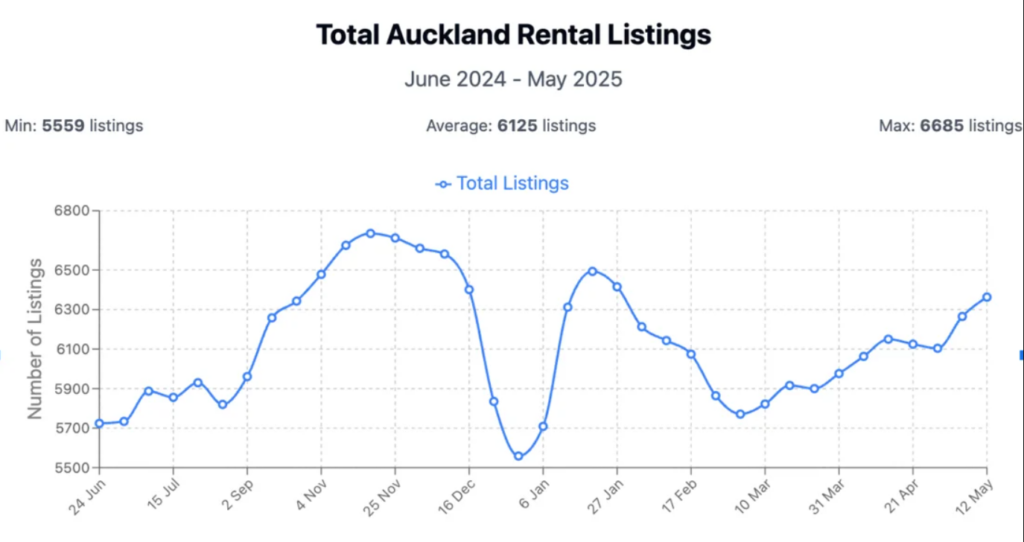
Trade Me rental market insights
From this Trade Me data we can see that demand is down YOY in Auckland, Waikato and just slightly down (1%) in the Bay of Plenty, and supply is up in Auckland and Bay of Plenty, with a huge increase in Waikato of 22%. Properties are all taking longer to rent than they did at the same time last year.
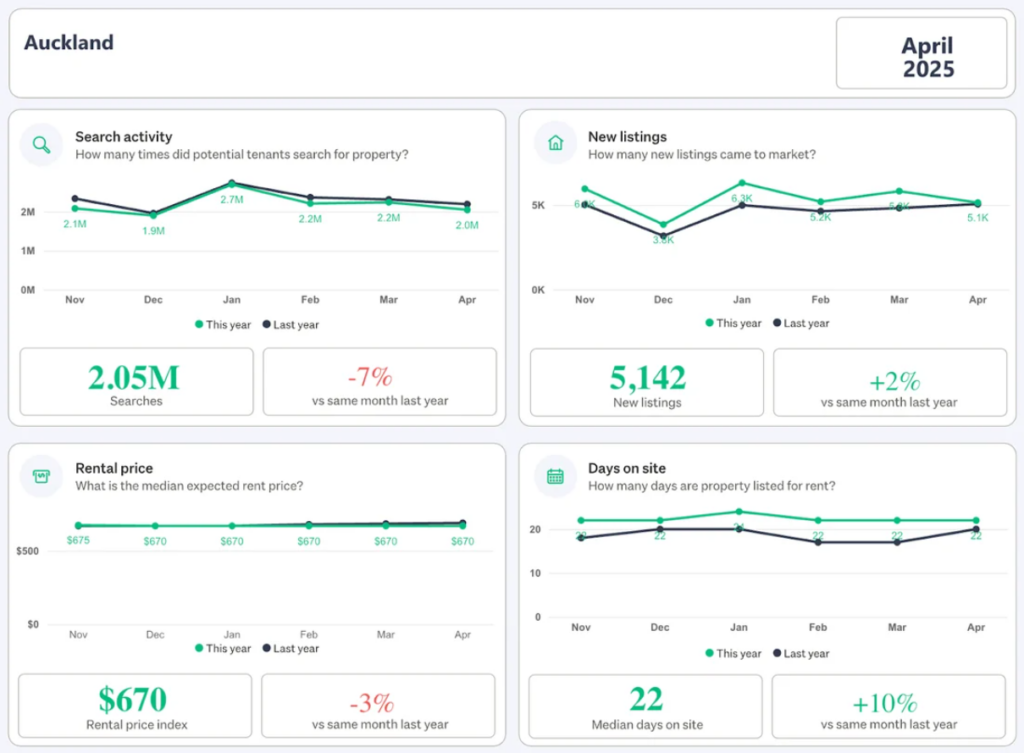

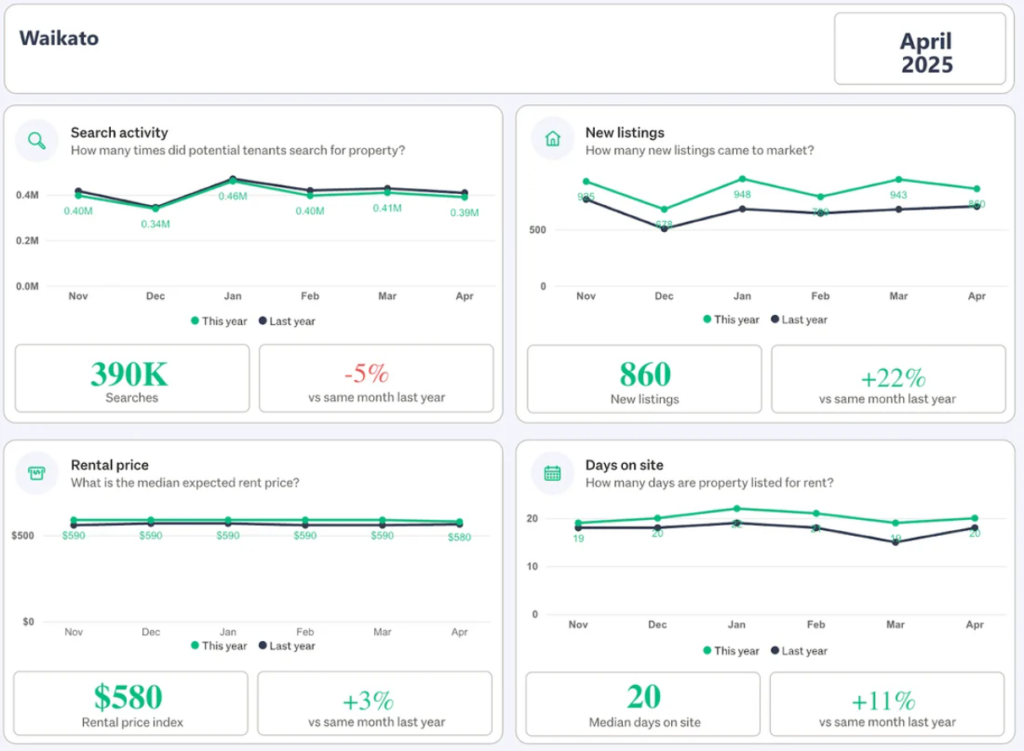
Auckland’s top suburbs by demand and supply
Here is some helpful information if you are looking to buy another rental property.

Net migration
Net migration is down 74% on the same time last year – why is this significant for the rental market? As you can see in the numbers in the chart below, the most significant changes are in the number of non-NZ citizens arriving and departing – arrivals are down 33% and departures are up 35%. And even though the overall number is still positive, it’s far smaller than in the past. Non-NZ citizens are more likely to be renters than homeowners, which is why it’s an important figure for landlords to keep an eye on.


What we are doing at Aspire in this market
While the residential rental market presents challenges with increased listings and reduced demand, we are doing everything we can to tenant properties as quickly as possible. We have dedicated lettings staff who are experts in tenant selection and who are 100% tasked with renting properties. We now offer viewings 7 days a week, enabling more potential tenants to view the properties we have available to rent.
Healthy Homes Compliance Deadline is Looming!
You now have only 43 days to get your rental property Healthy Homes compliant. The government is taking compliance seriously; they are conducting random audits (we’ve had several of our properties audited already!)
Contractors are very busy with landlords rushing to get heat pumps and insulation installed. If you’re unsure if you comply, here is some information about the Healthy Homes Standards
What's Happening at Aspire?
We’ve expanded the team again—we now have over 25 staff working hard to keep our customers’ properties operating at their best. Our Operations Manager, Daisy Sievewright, has been promoted to General Manager to help us perform at our best as we grow as a business (Mike is still working full-time as the Managing Director).
If you have any questions, or you would like to join Aspire, please feel free to contact us now!
Get to Know Aspire Property Management
We had a lot of fun shooting a video last month, so you can get to know us better.

